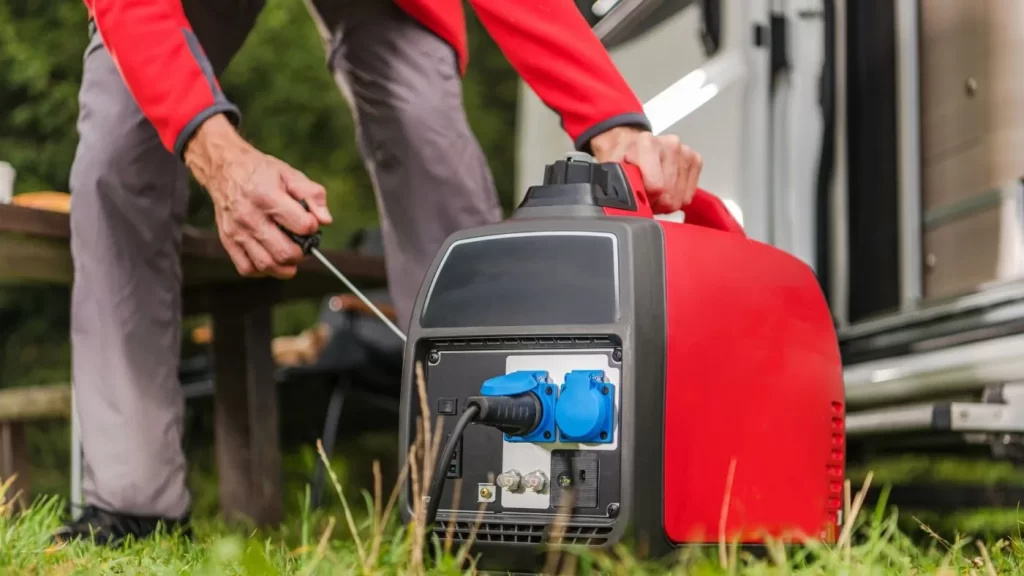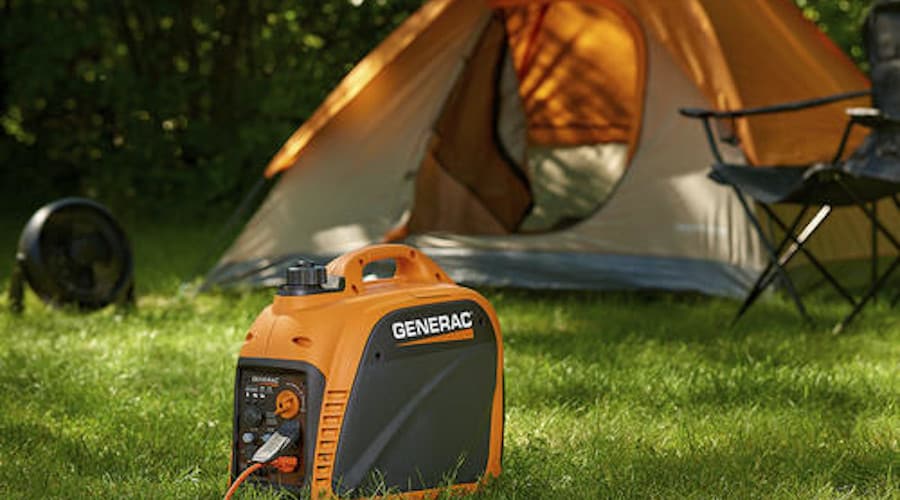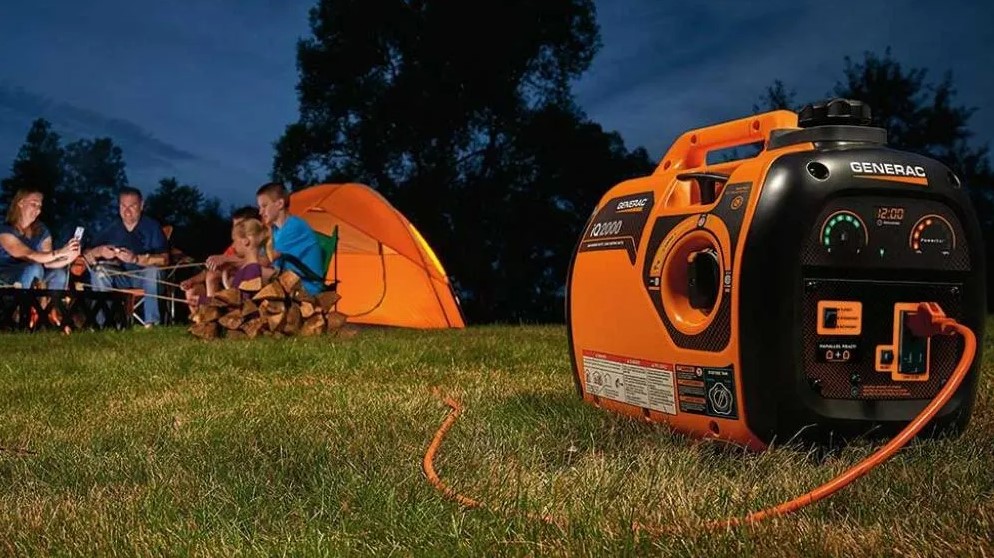A portable generator for camping is a must when you need electrical equipment to light, charge devices, or cook food outside, in case you have no propane stove. But do you need to ground your generator to secure yourself, your camp, and nature outside?
The answer is Yes, as any generator is a source of electrical power, and it’s essential to fix it properly grounded to plug electrical appliances in.
Not all portable generators are simply attached but they will secure your rest during a camping trip. Some generators require a solid copper wire and a grounding rod, tools to safely ground.
Below we outlined some tips to improve security and minimize the risk of electrocution and damaged equipment to ground a generator. You can also learn whether you need to earth-ground your generator model or not.

What is grounding?
Getting ready for camping and choosing the portable ground generator, check the owner’s manual. Various models suggest different options.
Grounding is an electrical circuit connected to a reference ground. Your home electrical appliance has three wires, and one of them is earthed to the ground. The generator’s frame or housing serves as the electrical circuit, and most camping generators have a copper ground rod used as a reference ground.
If there is a copper wire on your generator’s frame, you can attach it to the grounding rod for safe and proper grounding.
It is a very important procedure, cause a short circuit may result in a fire, damage wires, and property, harm nature, and even lead to serious injury.
Do all generators need to be grounded?
Home electrical systems have an internal ground line that dissipates the unneeded electricity into the ground, they should also have the ability to dissipate faulty electricity into a safe place on the earth.
Generally, generators are grounded for safe operations, but certain generators are grounded by connecting the ground terminal of the receptacles and the other non-current-carrying components to the frame. Even in case, the battery is attached to rubber-covered surfaces, that are commonly used for quieting the battery, the generator frame should not be grounded.
Some use a dedicated ground rod connected to a grounding terminal provided somewhere on the body, but these are also different and possess different requirements depending on the local electrical safety code.

Do all generators have to be connected?
An electric generator as well as all home electrical equipment provides unwanted voltage from causing damage to the ground and for this purpose, it should be connected to ensure security reasons.
Camping generators are created to be used outside. They are smaller, lighter, easier to be attached, and sometimes provide less power. They provide a good electrical connection to charge electrical devices or to cook outside. It’s also essential to ground a generator correctly.
As it was mentioned above, for security matters you may use a generator’s ground terminal or other current-resistant components on a frame such as a fuel tank, an engine block, or other components. Sometimes a portable generator needs a separate ground rod attached to a terminal to ground your generator.
For safety reasons, a small metal rod may be considered illegal. As for the local electrical code, it should be not less than 8 feet.
Does a portable generator need a grounding rod?
To ground your portable generator correctly, you do not need a dedicated ground rod if that is not required in the owner’s manual. Neither the National Electrical Code nor local grounding codes recommend grounding the engine with the ground rod.
It was originally thought that the most portable generator components were mounted to the generator’s metal frame. Due to its construction, people often don’t ground their generators. If the appliance is directly connected to a portable camping generator and the transfer switch is used, then the portable battery is grounded.
Some constructions need to be grounded with a buried ground rod. In this case, keep in mind to use a copper grounding rod made of galvanized steel. Such materials have the most electrical conductivity.
In advance, try to think about the distance from your generator to the ground rod because you need at least 4 feet of a copper ground rod long. A copper-coated steel rod will serve you the best to ground your generator when camping.
Most camping generators are usually equipped with a fuel tank, a motor, and a housing attached to the frame, so such devices should not be grounded.

Earth-grounding portable generators
Most portable generators can easily be earth-grounded with a long copper rod, a copper wire, and appropriate tools.
It will take you several minutes, some knowledge, and non-professional skills but they are worth it to save your life.
Take a four-feet copper wire and six or 20-feet wire. Depending upon the generator’s handle, it is possible to wrap the copper wire into a metal handle.
Find a soft ground spot where the grounding rod will be settled. Use a hammer to insert the copper rod into the ground deeply. As soon as a grounding rod is hidden, make sure it is not completely dry. Cause slightly damp soil helps to avoid poor conductivity.
Now it is time to connect a copper wire tightly to the grounding rod with pliers or a wire stripper. As it helps to link a copper wire to a ground wire and a generator. At the back side of a control panel, there should be the other wire’s end. It is usually marked with a ground symbol. Connect it to the generator’s grounding terminal.
To finish the earth grounding, simply loosen the grounding bolt with a wrench.
What wire is used to ground a generator?
Different wires are possible. The size of a grounding wire will be determined by the size your generator uses. You can also get some excellent copper wire in six-ten and twelve gauges. As long as a copper rod is 4 feet off of their campsite, use it for generator grounding. Depending on your location, it might be worth taking it a little further.
Generator grounding does not require special skills, but for security, it requires exact knowledge. So, if you cannot find a grounding rod, never attach the copper wire to your car chassis. The chassis isn’t earth grounded. You can cause electrocution, fire, and other damage.

When a generator should be grounded?
Is it a must to ground an electrical generator? Yes, it is essential to ground your generator when you are using over 10 kWh.
Most RV owners do not use such powerful electrical devices in camping, so often they keep an ungrounded generator to power small devices. Simultaneously, if the components of a generator are attached to the metal frame, you should ground your generator.
The camping generator requires grounding only when it is mentioned in the manual. If you cannot find the necessary information, you can always contact a licensed electrical engineer to learn information about the exact model.
For instance, YAMAHA EF2000IS Generator Manuals suggest connecting the ground terminal to Earth (or grounded rod) if your electrical appliances are grounded or not.
There is one more camping generator known as WEN56203i, it should be grounded using a 12 AWG copper rod. But the manual also gives recommendations to apply local grounding codes.
What happens if you don’t ground a generator?
Grounding a generator when camping is a secure procedure, especially when you are plugging your camping generator directly into a wired circuit system.
The following risks may happen:
- short-circuit resulting in electrocution and fire
- expensive electric equipment may be damaged
- wirings and cables might be burned out
- ignition, leading to a fire inside your camp
To prevent such risks, you’d better ground your generator in case of using powerfully connected appliances.

What tools do I need to ground a portable camping generator?
Generator grounding is not a complicated task if you have the right tools and know how to job safely with electrical devices.
You need wire strippers, solid copper wire, a metal rod, a hammer or a mallet, pliers, and a wrench.
A set of wire strippers
The properly stripped wire will serve you the best to connect the wire to the rod and the generator. Wire strippers will help you with this, or you may always find a simple sharp knife.
Solid grounding wire
You need to find a long enough wire for the proper and tight connection
4-feet copper ground rod
Another elongated element plays an essential role when you need to ground the generator safely. The copper ground rod should be at least 4 feet long.
A hammer or a mallet
A hammer helps to drive the copper rod into the ground for proper grounding. Keep in mind not to damage the surface of the rod to get good conductivity.
Pliers
All the connections should be firmly twisted with the help of pliers.
Wrench
To link the wire to the generator, use a wrench to loosen a grounding bolt slightly and then re-tighten the bolt to secure it is fixed.
You may also need water to ground a terminal in case the soil is extremely hard and dry to provide better conductivity. Also, water will help to insert the rod into the ground.
Sometimes it happens, the soil is hard as it is rocky terrain, and you cannot attach the rod deep enough to the ground terminal, in this case, you require a shovel. So, prepare it in advance. A screwdriver may also be useful to screw a grounding bolt.

Can I connect the generator to a trailer?
If you are camping in your vehicle and use an electric generator to power your RVs, your generator will need a grounded system. It is best to ground the generator by attaching the ground plug to the steel frame. You may also use ground rods when you are looking for safety.
Whenever you use an electric device on an RV, you will have to ground the generator. It’s easier for grounders to connect the ground terminal to an axle in the RV. You can use ground rods for the task to ensure safety.
Do you really need to ground a portable generator?
Different models of camping generators have various requirements, so you can easily learn the user manual, but if you are still concerned and use a huge amount of electricity, more than 10kwh, you definitely should ground a generator for safe usage.
If travel generators supply electricity to a structure by connection via a transfer switch to a structure (house offices, shops, trailers, and such), they should be connected to ground electrical equipment such as an electrical ground rod driven.

What happens if you don’t ground your generator?
If the same generator connected to your home electrical devices works properly without being grounded, it doesn’t mean that you can safely use it outside.
When your generator isn’t connected, the paths of the lowest resistance can be blocked and cause electricity to flow to locations where it is no longer needed resulting in electrocution, or damaging electrical machines, wires, or other equipment.
That is why any portable generator should be earthed. Grounding provides low-resistance backup paths for electric current flow, securing your property and health.
Do you need to ground a generator if you use an extension cord?
The answer is no, you don’t need to ground a generator. Using an extension cord directly connected to your camping generator is useless because it is responsible for providing power to outdoor equipment.
Meanwhile, indoor electrical components are best powered by using a transfer switch.
Do I need to ground my portable RV generator?
The answer is no. No earth-ground rod must be used for portable generators that run only one RV. If you want to use big generators in rallying for power distribution, this is a completely different situation and requires some grounding rods.

Summing Up
Do I need to ground my generator when camping? It depends on the model of the generator you have. Preparing for the camping journey, I always check the manual’s recommendations to ground my generator and take the required tools, necessary wires, and fuel if needed.
If I cannot find the information, I try to observe my electrical device. Most generators are framed in a housing that serves as a grounding, connected by the ground terminal. They usually come with a wire that is already insulated and there is no need to earth-ground them.
Sometimes you may notice rubber pads beneath your generator, they also serve as a frame that should not be grounded. Other models require a dedicated grounding rod attached to a terminal.

My name is Olivia Kellison. I have been camping with friends and on my own for a long time. For me, camping is a great way to escape everyday life’s chaos. I started this blog because I have always had a passion for the great outdoors, and here I am gladly sharing what I know with other outdoor enthusiasts. It does not matter whether you are an experienced adventurer, or just planning your first trip, my blog will be of great help to you.

